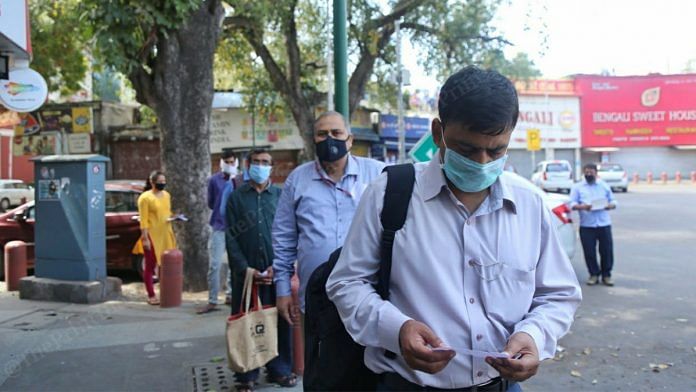 Managing COVID: A task well-begun
Managing COVID: A task well-begun
Urjit R. Patel | The author is a former Governor, Reserve Bank of India
The Indian Express
Patel notes that the measures announced by the Indian government against Covid-19 are “sensible”, but also states that “we do need to expend more resources on preventing Covid’s spread because massive prevalence testing now could, but not guaranteed to, help avoid another national lockdown or reduce the need for multiple localised lockdowns later”. He comments on the economic impact on developing countries and writes that India needs to keep its public finances healthy to ward off a second wave of financial crises after the coronavirus lockdown. He adds that India cannot risk widening its “perpetually high” fiscal deficit, despite calls for more stimulus and also asks the government to be vigilant about the banking sector. Patel writes, “At some point, international investors will begin to sharply distinguish between countries along the principal measure of how successfully the health challenge is being met, which will determine how quickly and durably individual economies will get back on their feet”.
 How to restart the economy after the lockdown: Here’s how India can meet perhaps the greatest challenge of our times
How to restart the economy after the lockdown: Here’s how India can meet perhaps the greatest challenge of our times
Raghuram Rajan | Indian economist
The Times of India
Rajan notes that “with the right resolve and priorities, and drawing on India’s many sources of strength”, Indians can beat coronavirus while maintaining a hopeful tomorrow. Acknowledging the lockdown as a good step, he adds that India needs to ramp up testing to ensure that we don’t go into another, longer lockdown — one we can’t afford. He emphasises India’s need to “ensure that the poor and non-salaried lower middle class who are prevented from working for longer periods can survive.” Rajan also states that while the RBI has injected liquidity, it can go a step further and “lend against high quality collateral to well managed NBFCs.”
 Reducing farm distress during a pandemic
Reducing farm distress during a pandemic
Himanshu | Associate professor, JNU
The Hindu
Opening with the migrants’ exodus, an after-effect of the lockdown, Himanshu shifts focus to agriculture. “Even before the lockdown, rural wages were declining in real terms but there were hopes for agricultural incomes rising with food prices rising until January 2020.” However, he notes, recent data reveals that the trend is reversing with the decline in agricultural markets in most places. Himanshu also sheds light on a possible break in food chain supply amidst the lockdown given that April is a labour-intensive month. He believes it is time “for the government to release the food stocks through the public distribution system.” He also notes that the steps taken by the Centre — 5 kg of free grains to be distributed in addition to what people are entitled to under the National Food Security Act — are not able to reach states due to the lockdown.
 Containing the economic impact of Covid
Containing the economic impact of Covid
Ashima Goyal | Professor, IGIDR, and Member, EAC-PM
The Hindu Business Line
Goyal writes on the impact of Covid-19 on the financial sector of India. “The Indian financial sector is said to be in a weak state, making it unable to withstand this new shock”, explains Goyal. She argues that “financial institutions and markets need a combination of liquidity support, capital injections, lower rates as well as discipline from strong corporate governance”. She warns that “temporary payment difficulties must not be allowed to lead to a chain of bankruptcies that magnify each other.”
 Finance to the fore
Finance to the fore
Ajay Shah | The writer is a professor at National Institute of Public Finance and Policy, New Delhi
Business Standard
Shah, too, comments on the financial sector and how it should respond to the Covid-19 lockdown. “In the best of times, financial capital is a scarce resource, and the financial system rations this out between multiple claimants”, explains Shah. He argues that in these grave times, finance must be allocated efficiently. He warns that “when there is an economic downturn and many borrowers get into trouble, this inevitably affects the banks that have lent to them.”
 Interdependence in corona world
Interdependence in corona world
Sunita Narain | The writer is at the Centre for Science and Environment
Business Standard
Narain comments on the community transmission stage in the coronavirus pandemic. In the community transmission stage, one cannot trace how a person got infected and this leads to mass spreading of the virus as isolation doesn’t remain possible. “All the evidence is pointing to the fact that as the cases reach community spread, the deaths increase because countries cannot provide the intensive care that is needed”, explains Narain. She argues that “we cannot afford community transmission; we have to contain and to prevent” because our testing capabilities are limited.
 Let us not underestimate the pandemic’s economic fallout
Let us not underestimate the pandemic’s economic fallout
Kaushik Basu | Chair professor at Cornell University and Infosys Prize Jury chair
Mint
Basu writes on the nationwide lockdown in India to suppress the spread of Covid-19. “It is good to see India taking early action, even though there is no denying that we should have anticipated the hardship caused to poor workers and migrant labour, and taken preventive steps”, explains Basu. He argues that “these early actions have to be carefully managed if we do not want the virus to be dwarfed by an economic collapse”. He says, “It is a fine balance between controlling the virus and enabling the economy to function” and “we must have the resolve and the wisdom to strike that fine balance.”
Today’s editorials
The Hindu: Karnataka closing its border to the neighbouring state of Kerala raises the question whether legal measures taken by the state to prevent further spread of Covid-19 can extend to a point where there is no exception, even for medical needs. Karnataka’s argument is that Kerala’s Kasaragod has the largest number of positive cases. The daily notes that inter-state migration and quarantine are under Centre’s list and the responsibility to prevent a breakdown of inter-state relation lies with the Centre.
The Times of India: As Maharashtra recorded the highest mubed of Covid-19 cases in a single day Sunday, its capital Mumbai encapsulates the challenges that densely populated parts of India will have to overcome to restore normalcy. TOI notes that the dense urban clusters are at greater risk and Dharavi, which is Asia’s largest slum, has already seen death due to Covid-19. Governments need to be successful in their containment strategies over the next few days if we are to minimise the economic costs of the lockdown.
Hindustan Times: The coronavirus crisis and the nature of responses say something about the global economic paradigm. The welfare state is back, which is the most significant transformation in global economic policymaking. A greater reliance on technology is also expected, it notes. Welfarism and enhanced state role, as well as technological disruption, will dictate the post-pandemic order.
With inputs from Unnati Sharma



